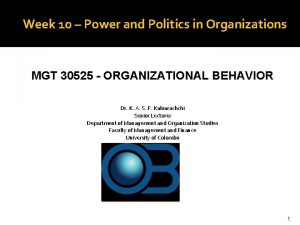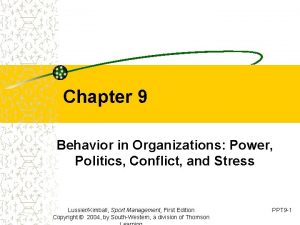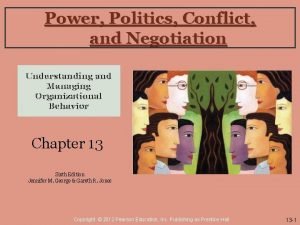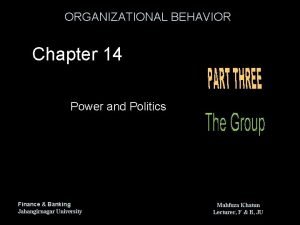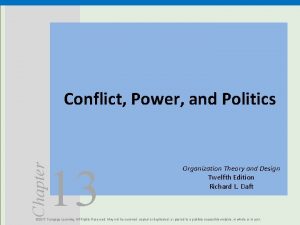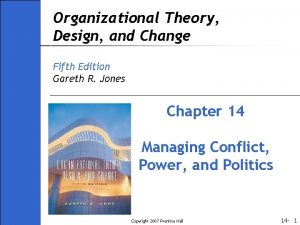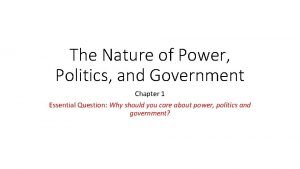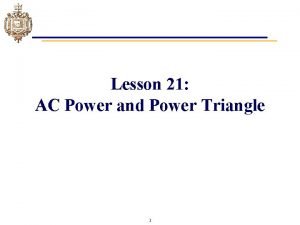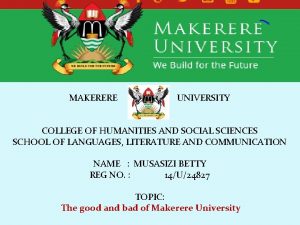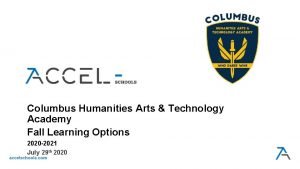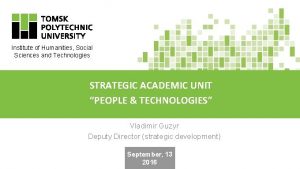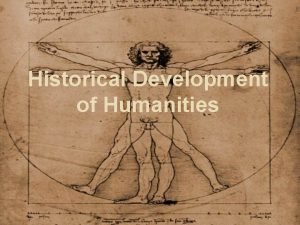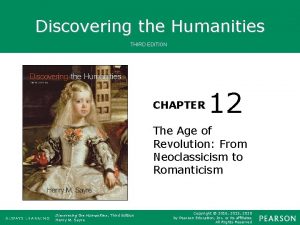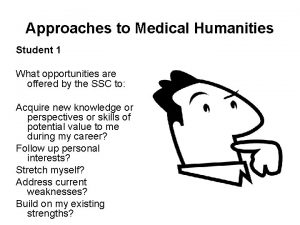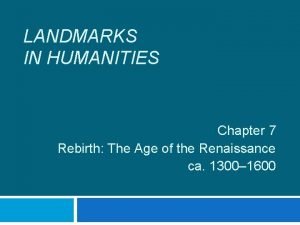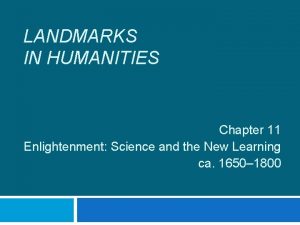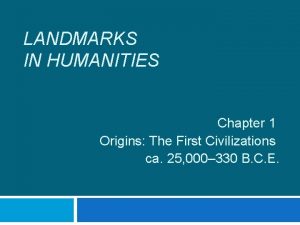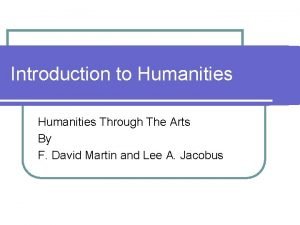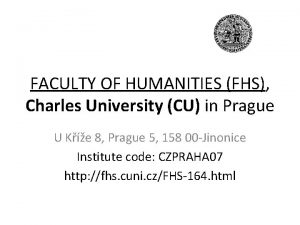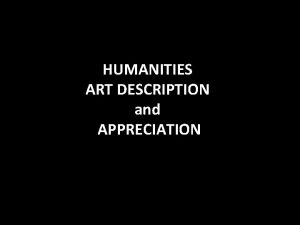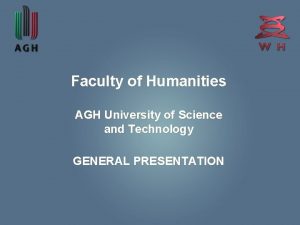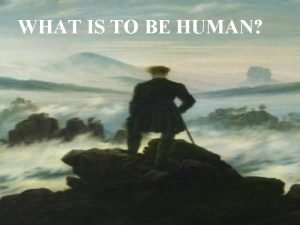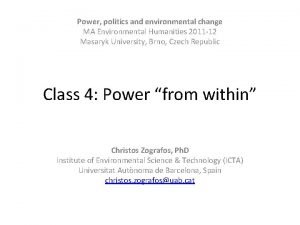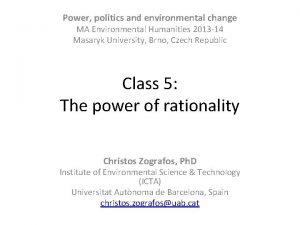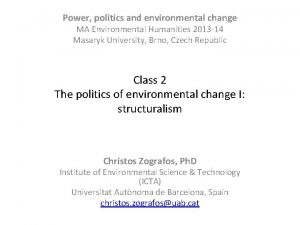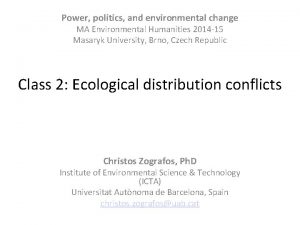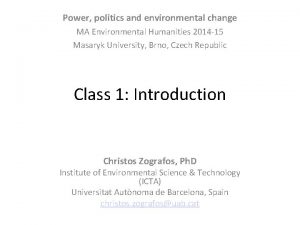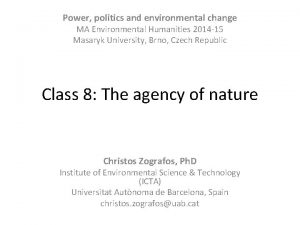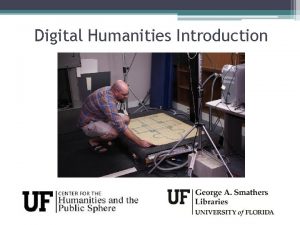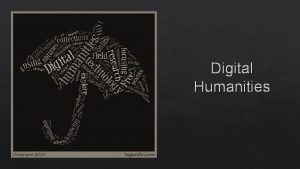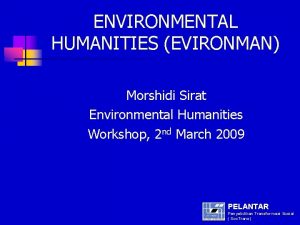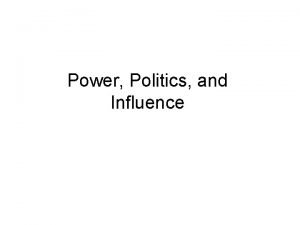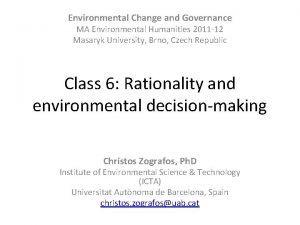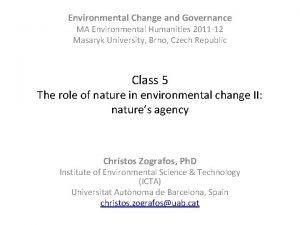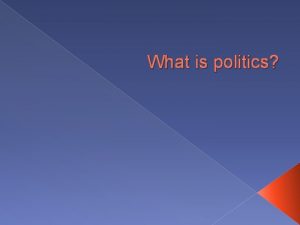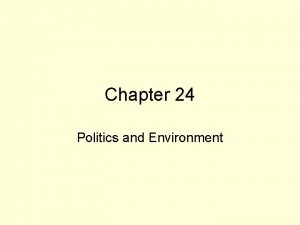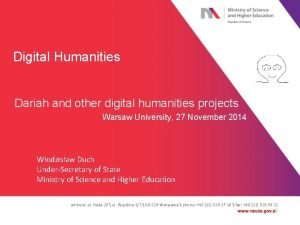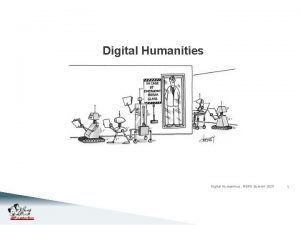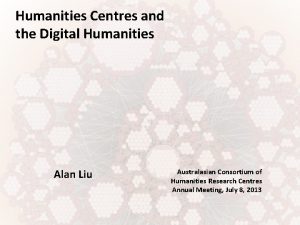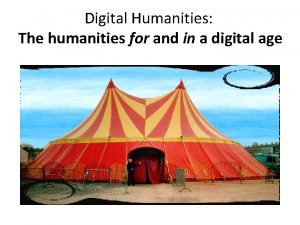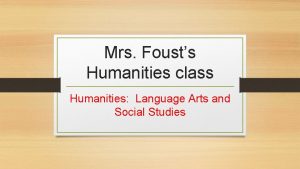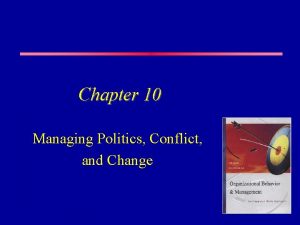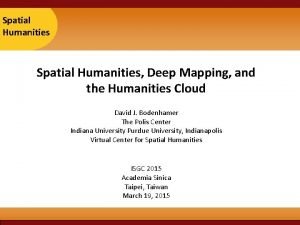Power politics and environmental change MA Environmental Humanities


























- Slides: 26

Power, politics and environmental change MA Environmental Humanities 2014 -15 Masaryk University, Brno, Czech Republic Class 7: Incomplete dominations Christos Zografos, Ph. D Institute of Environmental Science & Technology (ICTA) Universitat Autònoma de Barcelona, Spain christos. zografos@uab. cat

Intro • Purpose: explain how post-structuralism studies – The operation of power through discourse – The limits of power and domination • Reason why you should know this: – Because limits to power-domination are equally important as domination for understanding why and how environmental change happens 1

Class outline • Assignment answers – To see operation of power through discourse • Exercises – To see the limits of power 2

Assumptions and starting points • St. Martin: fisheries are privatised, i. e. their ownership is being given to individuals – This is what he calls a “capitalist dynamic”, “capitalist relations”, etc. – Because ‘capitalism’ is an economic system at whose basis is the idea and practice of private ownership of the means of production (e. g. land, and NR more generally – such as fisheries) • QUESTION: St. Martin thinks this is problematic: why? – because an alternative ownership regime, common property (different from private and state property) can be better ecologically-speaking – Evidence of this around world where common property regimes have sustained both human and ecological populations in very fragile and ecologically important environments (e. g. peri-desert areas in Western Africa) • So, he tries to find out how common property is being made to look irrelevant for NR management 3

CLASS ASSIGNMENT 2 St. Martin (2006) explains that “As with past enclosures of common property, the discursive enclosure clears communities and their associated social/cultural relations from the domain of economy and produces a resource open to discursive and literal appropriation” (p. 173). • According to St. Martin, there is a dominant discourse: – What it says? – What it does? – How it does it? How does that happen? 4

“There is a dominant discourse” • What is the name he gives to that discourse? – The “bio-economics discourse” • What discourse says: – The ‘bio-economics’ discourse holds that the economic dynamic of fisheries is the domain of fisheries bio-economics 5

The bio-economics discourse What does the discourse say? The “ontological frame” • Economic subject: “the fisherman” = utility-seeking economic man (individual) • Economic space: fishing space = a container of resources available-for-appropriation • Subject + space: individual, mobile, competitive utility-maximisers (fishermen) work in abstract space containing quantities of fish (the sea) – Where fishermen go, with whom, from where: irrelevant – Economic space: governed by single economic calculus 6

Importance of discourse: policy interventions What it says? • Loss of economic rent = because there is a deficiency in property relations – Absence of private property • Common property fisheries (i. e. where community is the owner of the resource) – Pre-capitalist or not-yet-fully capitalist – Less efficient and productive • Commons: can only aspire to become capitalist via – Private property – Management schemes to stimulate such relations 7

What does the discourse do? • Displaces community from economic dynamic of fisheries • Encloses fisheries in singular capitalist (private property) hegemonic dynamic 8

Importance of discourse! Its function What it does? • Academic, governmental, and international organisations have all adopted this vision of fisheries • …and based on it have: – designed data collection initiatives – performed scientific analyses – developed management strategies • To justify and advance privatisation of natural resource (fisheries) 9

How does it do this? • ‘Disciplining’ of community: geographic dimension – Fisheries: in sea vs. Community: inland (where fishers live) – Ports: place of community vs. Sea (resource): place essential economic dynamic unfolds – “Community resides on land while processes of economy are at sea” (p. 178) 10

Disciplining • “This article is, therefore, an interrogation into the emergence and subsequent disciplining of community in fisheries resource management” (p. 171) • QUESTION: What does that mean? – Communities are made obedient (disciplined): not to move into thinking that they may have property rights in the sea – Based on ideas of Foucault 11

Foucault: exercising power • Power can be exercised in more subtle ways (than outright oppression) • i. e. by establishing normalised and ‘deviant’: behaviours (homosexuality), processes (democracy is inefficient), actions (stealing = crime), persons (lepers=unhealthy), places (Africa is dangerous, e. g. disease, crime), etc. 12

Dominant ‘bio-economics’ discourse How does the discourse attempt to discipline communities? With what mechanisms of power? • Economic impact analysis – – Assess Econ + Soc impact of FMPs Impacts on fishing communities: look recent econ changes Measure: gross revenue by region (i. e. in terms of $$) = community health “Location of community groups” map: in land • But what relation with resource? • Social impact analysis • Public participation meetings: – No connection ports (community residence) – sea (resource site) – Community: site of impact of decisions taken re: sea (e. g. enclose or not? ) – Community: studied by anthropologists (domain: culture) no implications for NR mngm – all community issues = struggle over allocation of catch – community = desires of individuals to increase harvest – The economic domain (i. e. resource in the sea) remains strongly bounded (enclosed) 13

Foucault: a geographical approach • Using EIA, SIA, and public participation meetings – To establish the bio-economics discourse in order to • To shape the space of fisheries as – Container of resources available for appropriation – Space where utility-seeking economic men operate • Disciplines communities – not to think of the sea/NR as anything else but above – No other policies, property rights regimes (private) 14

Post-structual view of power • Power imposed through discourse/ knowledge • Through the ‘construction’ of (what it means to be) a resource (e. g. the fisheries), a human group (e. g. fishermen), a space (periphery of New England), an identity (student) 15

The material result • “As with past enclosures of common property, the discursive enclosure clears communities and their associated social/cultural relations from the domain of economy and produces a resource open to discursive and literal appropriation” (p. 173) Discursive enclosure: fishermen; community; fishery communities Socio-cultural relations Economy NR: fishery Discursive Literal (material) APPROPRIATION (by Kist relations) 16

Block 2 THE LIMITS OF DOMINATION (POWER) 17

St. Martin, 2006 Challenging power • “To accept communities everywhere, to see them as co-extensive with [= having the same scope as] the urban and mixed industrial environments of the Northeast (as opposed to only in isolated rural villages), threatens the dominant discourse” (p. 177) [and the privatisation management regime] • QUESTION: How does that happen? – Get into groups and answer question (can read text) – Begin: what is/ says dominant discourse for N. England Communities? 18

Back to fisheries in New England • Dominant discourse: where can you find “fishing communities”? – ‘Fishing communities’ exist only in developing, pre-capitalist places – In a developed country such as the USA, they may only exist in peripheral places such as rural Alaska Fishing community at Kazinga, Uganda James Brown (Source: http: //www. new-ag. info) Akutan in the Aleutian islands (source: http: //jacobimages. photoshelter. com) 19

Back to fisheries in New England • Fishing communities don’t exist in mixed industrial environments of New England – These are not “traditional”, pre-capitalist environments – To be heavily dependent upon fisheries Source: photographersdirect. com • There: – More (and industrial) economic activities take place: mixed industrial & fisheries – You only have some individuals fishing – Communities are in land – Commons rights to sea: unthinkable of Source: http: //esteveporfolio. blogspot. com 20

But, • St. Martin tells us: – Wait a minute – If you look closely, you will realise that fishing communities also exist in mixed, industrialised spaces such as New England! • QUESTION: How does he find out this? – Mapping of communities in the sea 21

Shaping of community space: where is community constituted (St. Martin, 2006)? In land: New England Fishery Management Council, 2001 In the sea: GIS map of community presence in sea by port of origin • Map 1: community in land (only individuals fishing in the sea) • Map 2: community in the sea (fishing trips by port of origin) 22

Shaping of community space: where is community constituted (St. Martin, 2006)? Q: What does his mapping exercise achieve? In land: New England Fishery Management Council, 2001 In the sea: GIS map of community presence in sea by port of origin • Mapping exercise: places communities “back in the map” as potential NR owners: it maps community back in the sea resource • Fisheries: de facto commons, because people of same community reproduce community via space they use + practices of reciprocity in sea • Maps: technologies of imposing and negotiating power 23

Spaces of opportunity • Mixed industrialised environment of New England – Not worthless, spaces where tradition has been dominated by modernity – Neither modern nor traditional • Mix/ hybridity = evidence that capitalism/ modern state domination project = incomplete! – Space where pre-modern, alternative NR management regimes (commons) are still possible – State attempts to establish modern (bio -econs) regimes based upon presenting fisheries as spaces of private econ activity, community as sites of management impact, etc. through policies, events (e. g. participation) and documents are still unfinished/ unsuccessful Copyright: Matt Wickenheiser | BDN (source: http: //bangordailynews. com) 24

Studying power: the post-structuralist way • Study ways in which social groups, resources, and spaces are constituted/ shaped (Paulson et al. , 2005) • How does power operate? – Where is power ‘located’/ operates: inside ‘the subject’ – Power forms ‘the subject’ from inside, through rules (s)he voluntarily follows, even whose application by others (s)he monitors – Robbins (2007): US suburbs ‘lawn people’ voluntarily contaminating environment and themselves while complying to rule/ image of “good citizen” • How can power be challenged (a main way)? – Study places, resources, spaces, communities – not for domination, but for diversity and as spaces of opportunity – E. g. where pre-capitalist/ modern elements (e. g. community) still exist! 25
 Power and politics in organizations
Power and politics in organizations Power politics and conflict in organizations
Power politics and conflict in organizations Conflict power and politics
Conflict power and politics Illegitimate political behaviour
Illegitimate political behaviour Power and politics organization theory
Power and politics organization theory Power and politics
Power and politics The nature of power politics and government
The nature of power politics and government Political power definition
Political power definition Triangle of power
Triangle of power College of humanities and social sciences
College of humanities and social sciences Columbus humanities arts and technology academy
Columbus humanities arts and technology academy Art and humanities endorsement
Art and humanities endorsement Ihsst
Ihsst Arts and humanities endorsement
Arts and humanities endorsement What is humanities
What is humanities Discovering the humanities 3rd edition
Discovering the humanities 3rd edition What is medical humanities
What is medical humanities Landmarks in humanities
Landmarks in humanities Landmarks in humanities
Landmarks in humanities Landmarks in humanities 5th edition chapter 1
Landmarks in humanities 5th edition chapter 1 Humanities through the arts
Humanities through the arts Brancusi
Brancusi Charles university faculty of humanities
Charles university faculty of humanities Composed primarily to be sung.
Composed primarily to be sung. Local guide program
Local guide program Human flourishing definition
Human flourishing definition Humanities group
Humanities group
